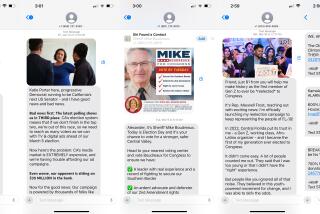Obama campaign first to accept donation by text message
- Share via
WASHINGTON -- Nine years ago, then-Vermont Gov. Howard Dean broke new ground when his campaign used the Internet to help raise what were then record sums for his insurgent White House bid.
Now President Obama’s campaign – whose digital strategist hails from Dean’s Internet operation – is pouncing on another technological tool, announcing that it would be the first presidential campaign in history to accept donations via text message.
Obama campaign officials hope this new method of making donations will boost contributions from small donors – particularly young ones – as the 2012 race heads into its final stretch.
“Grass-roots giving is powering this campaign,” campaign manager Jim Messina said in a statement.
“Accepting small donations by text message will help us engage even more grass-roots supporters who want to play a role by donating whatever they can afford to the campaign – and get the president reelected in November,” he added.
The program will be available this week for customers of Verizon, Sprint, T-Mobile and U.S. Cellular, who will be able to text “GIVE” to the campaign’s short code: 62262, which spells out O-B-A-M-A. AT&T; and other carriers are expected to sign on in the near future.
Republican challenger Mitt Romney’s campaign also plans to begin accepting text donations soon.
Donations via cellphone numbers will be capped at $50 a month per candidate or political committee and $200 an election cycle -- the maximum an individual can give anonymously. A portion of that money will go to fees for the wireless carrier and a third-party aggregator that will facilitate the transactions. Donations will be charged to a contributor’s wireless bill.
Once a mobile number reaches $200 cumulatively for a particular committee – the threshold at which donor information must be reported to the Federal Election Commission – a campaign can block the donation or request information from the contributor in order to accept it.
“It’s going to be a political tsunami,” said Democratic strategist Mark Armour, a consultant to payvia, the third-party aggregator that will facilitate the transactions. “Get ready for millions of small donations.”
Text donations are already widely used by charities, such as the American Red Cross, which have successfully raised millions of dollars via text during natural disasters and other crises.
Political campaigns have been eager to harness mobile phones in their fundraising, but the method faced legal and technical obstacles.
Two years ago, the FEC considered a similar text message donation plan by the wireless carrier association CTIA, but the proposal foundered when the group could not figure out how to comply with the requirement that campaigns deposit donations within 10 days, among other technical challenges.
This June, in a rare act of bipartisan agreement, the Federal Election Commission approved a text donation proposal by Los-Angeles based m-Qube Inc., a plan supported by both the Obama and Romney campaigns.
The proposal got held up as wireless carriers asked the FEC for clarification on several details, a delay that kept Obama campaign officials – eager to have the plan in place for next month’s Democratic National Convention -- waiting anxiously. In late July, Obama campaign lawyer Robert Bauer called FEC commissioners to ask them to respond to the carriers quickly, expressing concern that the campaign was running out of time to implement text donations before election day.
The FEC gave final blessing to the plan Aug. 14.
Alan Sege, general counsel of payvia – a new company spun off of m-Qube last month – said the company has already signed multiple federal campaigns as clients.
“Our hope is this is going to become one of the definitive campaign finance channels for the 21stcentury, because it’s immediate and anybody can contribute to the political committee of their choice, using the completely familiar interface of sending a word to a phone number,” Sege said.
Peter Pasi, a Republican digital media consultant, cautioned that it remains to be seen whether text donations “will move the needle in a huge way.”
“It’s hard to imagine there are thousands of donors that haven’t given to either candidate who will now be motivated because this capability now exists,” he said, adding that text donations usually are most effective when connected to major events.
But he noted that with the party conventions looming, “both parties have huge nationally televised events over the next two weeks, so this will provide them the opportunity to maximize the potential of this medium.”
Follow Politics Now on Twitter
More to Read
Get the L.A. Times Politics newsletter
Deeply reported insights into legislation, politics and policy from Sacramento, Washington and beyond. In your inbox twice per week.
You may occasionally receive promotional content from the Los Angeles Times.










